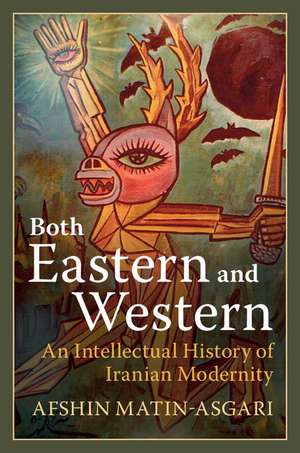Both Eastern and Western: An Intellectual History of Iranian Modernity
Autor Afshin Matin-Asgarien Limba Engleză Paperback – 15 aug 2018
Preț: 288.63 lei
Nou
Puncte Express: 433
Preț estimativ în valută:
55.23€ • 57.83$ • 45.81£
55.23€ • 57.83$ • 45.81£
Carte tipărită la comandă
Livrare economică 05-11 aprilie
Preluare comenzi: 021 569.72.76
Specificații
ISBN-13: 9781108449977
ISBN-10: 1108449972
Pagini: 370
Dimensiuni: 150 x 227 x 20 mm
Greutate: 0.52 kg
Editura: Cambridge University Press
Colecția Cambridge University Press
Locul publicării:Cambridge, United Kingdom
ISBN-10: 1108449972
Pagini: 370
Dimensiuni: 150 x 227 x 20 mm
Greutate: 0.52 kg
Editura: Cambridge University Press
Colecția Cambridge University Press
Locul publicării:Cambridge, United Kingdom
Cuprins
Introduction: intellectual constructions of Iranian modernity; 1. Lineages of authoritarian modernity: the Russo-Ottoman model; 2. The Berlin Circle: crafting the worldview of Iranian nationalism; 3. Subverting constitutionalism: intellectuals as instruments of modern dictatorship; 4. Intellectual missing links: politicizing religion and translating modernity; 5. The mid-century moment of socialist hegemony; 6. Revolutionary monarchy, political Shi'ism, and Islamic Marxism; 7. Conclusion: aborted resurrection: an intellectual arena wide open to opposition.
Recenzii
'This unique book registers the many sources of influence, hitherto overlooked by the researchers in the field, that have shaped up modern Iran. Afshin Matin-asgari offers a meticulous and compelling account of the cosmopolitan character of modern Iranian intellectual, social, cultural, and political thought. A superb and authoritative reference for scholars and public alike.' Peyman Vahabzadeh, University of Victoria
'Afshin Matin-Asgari has written a highly succinct, readable, and perceptive work on the major issue confronting intellectuals in Iran from the late nineteenth century up to the 1979 revolution: the issue of how to discuss, confront, and deal with the intellectual challenge coming from the West. This is also an important contribution to our understanding of the eventual downfall of the Shah.' Ervand Abrahamian, City University of New York
'By focusing on the influence of the Ottoman and Russian models on Iranian intellectual thought, Both Eastern and Western offers an original and thought-provoking account of Iran's road toward 'modernity' in the twentieth century.' Rudi Matthee, University of Delaware
'Afshin Matin-Asgari's Both Eastern and Western: An Intellectual History of Iranian Modernity is a master stroke - resonating with earlier groundworks that had prepared the stage for this bravura delivery. He restages the central significance of the adventure of ideas in the making of nations at a time when state-centered political history is dimming the wit of much contemporary historiography. Deeply informed, politically committed, morally imaginative, Matin-Asgari's own book is a towering achievement of the intellectual history he chronicles with impeccable precision.' Hamid Dabashi, Columbia University, New York
'Afshin Matin-Asgari has written a highly succinct, readable, and perceptive work on the major issue confronting intellectuals in Iran from the late nineteenth century up to the 1979 revolution: the issue of how to discuss, confront, and deal with the intellectual challenge coming from the West. This is also an important contribution to our understanding of the eventual downfall of the Shah.' Ervand Abrahamian, City University of New York
'By focusing on the influence of the Ottoman and Russian models on Iranian intellectual thought, Both Eastern and Western offers an original and thought-provoking account of Iran's road toward 'modernity' in the twentieth century.' Rudi Matthee, University of Delaware
'Afshin Matin-Asgari's Both Eastern and Western: An Intellectual History of Iranian Modernity is a master stroke - resonating with earlier groundworks that had prepared the stage for this bravura delivery. He restages the central significance of the adventure of ideas in the making of nations at a time when state-centered political history is dimming the wit of much contemporary historiography. Deeply informed, politically committed, morally imaginative, Matin-Asgari's own book is a towering achievement of the intellectual history he chronicles with impeccable precision.' Hamid Dabashi, Columbia University, New York
Descriere
Studying intellectual trends in Iran in a global historical context, this new intellectual history challenges many dominant paradigms in Iranian historiography.
